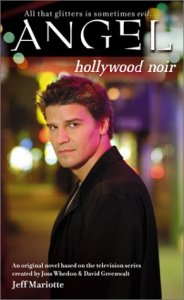“Angel” and hardboiled detective fiction are such a natural fit in book form that I almost wish every novel in the series used the style. But at least we have “Hollywood Noir” (January 2001), where Jeff Mariotte – in his second entry in the series – leans into the genre, while still writing a story that could only exist in the “Angel” world.
The action centers on the wonderfully named private detective Mike Slade, who was killed in 1961 but has come back to life and is investigating a case in present day. He’s a fish out of water in every way — one of the most interesting is the run-of-the-mill manner in which he pulls out his gun to achieve his goals, something that is frowned upon, to say the least, in the 21st century. In 1950s private dick fashion, Slade pulls out his piece to intimidate people, and although he is quick to shoot his way out of situations, he is an expert marksman who shoots to wound, not to kill.
Slade’s nemesis is Harold Wechsler, a criminal/politician (and, it turns out, demon) who has worked his way up the ranks to his dream job as the head of the Los Angeles water department. This villain might not make for great back-cover copy, but Mariotte does a nice job of explaining how this is a desirable position of power; indeed, it smacks of something like “Chinatown.”
Throughout the book, Mariotte effectively uses the “show, don’t tell” approach to illustrate the genre’s endearing tropes through Slade’s actions and the way he works the case. But on pages 282-83, the author comes right out and illustrates what we love about hardboiled fiction through Slade’s thoughts:
Private eyes were the toughest guys in town. They could take anything. Emotions didn’t get in their way. They were all about the case, the bad guy, the cash payment at the end of it. Sometimes they were about justice. That guy, Angel, seemed to be about justice. But also, private eyes were about doing what needed to be done.
Fitting with the genre, Slade is pragmatic. But as often happens, this setup leads to an emotional ending, as if private detectives simply bottle up their emotions. Indeed, he suspects he has been brought back to “life” in order to solve this case before finding eternal rest.
Mariotte also puts Angel, Doyle and Cordelia more in hardboiled mode than usual. As the lead detective, Angel gives his two associates assignments – Cordelia uses her feminine wiles to get into a storage garage to search through old files, while Doyle is tasked with a rather boring stakeout of a graveyard. Without stretching their characterizations, the author emphasizes the competence of Angel’s associates.
Additionally, we get a nice helping of the guarded exchanges of information between Angel and Kate, as he tells the police detective what he knows but omits all the supernatural parts, thus driving her to frustration.
I don’t recall that Mariotte’s later “Angel” novels are quite as hardboiled as this one, but as I get further into my re-read, I hope I’m wrong, because this is the literary version of “Angel” at its finest.

Click here for an index of all of John’s “Buffy” and “Angel” reviews.

